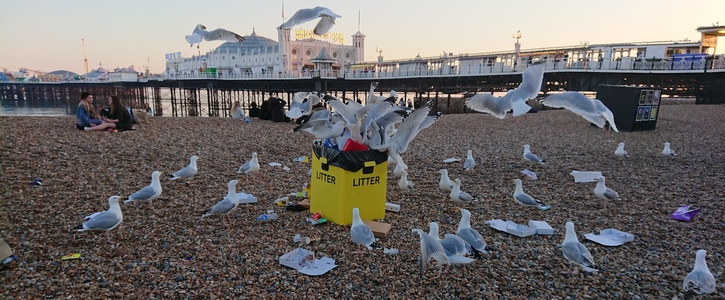100 signatures reached
To: Brighton & Hove City Council
#NoMoreRubbishBrighton: Keep Brighton & Hove Seafront Clean

Informed by a survey of almost 100 residents of Brighton & Hove and the surrounding area, the Brighton Dolphin Project has identified some key actions that local people want to implement in order to keep the seafront clean:
• Increase the number and size of the bins
• Ensure the bins are all covered
• Increase how frequently bins are emptied
• Increase the amount of signage: both to signpost the location of bins and to encourage people to use them - for example, showing the consequences of plastic pollution in the ocean.
• Install more recycling bins and promote their use
• Enforce existing littering fines
• Employ litter-pickers at weekends as well as during the week
• Implement tourist targeted litter policy - e.g. signage in station as well as the city and beach, and work with train companies
• Increase the number and size of the bins
• Ensure the bins are all covered
• Increase how frequently bins are emptied
• Increase the amount of signage: both to signpost the location of bins and to encourage people to use them - for example, showing the consequences of plastic pollution in the ocean.
• Install more recycling bins and promote their use
• Enforce existing littering fines
• Employ litter-pickers at weekends as well as during the week
• Implement tourist targeted litter policy - e.g. signage in station as well as the city and beach, and work with train companies
Why is this important?
We are calling for Brighton & Hove City Council to take action to reduce the amount of litter spoiling the city’s beaches. At present, too little has been done to keep beachside rubbish to a minimum. Bins are few and far between, with many lacking covered tops on beaches where strong winds and seagulls have no problem scattering even properly discarded rubbish across the pebbles. Although there are recycling bins between the piers, they are poorly signposted, reducing the likelihood of people making the effort to sort their rubbish and leading to recyclable materials heading straight to landfill.
Litter that ends up in the ocean doesn’t degrade quickly; most plastic debris will persist in the environment for centuries and may be transported far from its source, including great distances out to sea (Li, 2016). Even cigarette butts, the most prevalent litter item across the world, take years to break down in the sea (NOAA). Aside from changing the way we burn through single-use packaging and plastics, the best way to prevent them from reaching the ocean is to implement better waste-collection and recycling - we call on Brighton and Hove City Council to deliver this.
Beyond the environment, litter on the beach is an aesthetic blight in a city reliant on drawing in tourists - Brighton & Hove attracts over 8.5 million visitors a year and tourism contributes an estimated £780 million into the local economy (BHCC website, 2014). If people are put off visiting by litter-strewn beaches, the city’s economy - and its people - will suffer. The cost of improving the beaches will pay off, making Brighton a more pleasant place to visit and contributing to our most important industry.
Litter that ends up in the ocean doesn’t degrade quickly; most plastic debris will persist in the environment for centuries and may be transported far from its source, including great distances out to sea (Li, 2016). Even cigarette butts, the most prevalent litter item across the world, take years to break down in the sea (NOAA). Aside from changing the way we burn through single-use packaging and plastics, the best way to prevent them from reaching the ocean is to implement better waste-collection and recycling - we call on Brighton and Hove City Council to deliver this.
Beyond the environment, litter on the beach is an aesthetic blight in a city reliant on drawing in tourists - Brighton & Hove attracts over 8.5 million visitors a year and tourism contributes an estimated £780 million into the local economy (BHCC website, 2014). If people are put off visiting by litter-strewn beaches, the city’s economy - and its people - will suffer. The cost of improving the beaches will pay off, making Brighton a more pleasant place to visit and contributing to our most important industry.

